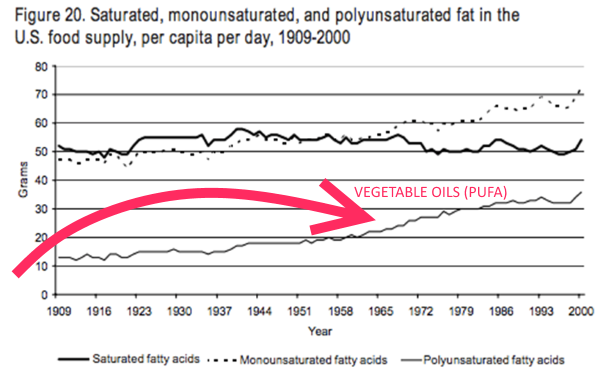If you listen to mainstream medicine, I’m sure you’ve only heard that you need to avoid sugar if you have diabetes or are pre-diabetic. But what if I told that mindset totally misses the mark and ignores perhaps a MORE important food that increases your risk?

According to Dr. Ray Peat, Ph.D., “Diabetes is just one of the “terminal” diseases that can be caused by the polyunsaturated vegetable oils.”
What does he mean by polyunsaturated oils? He’s speaking to any oils that have a large percentage of polyunsaturated fats, like:
Corn oil
Soybean oil
Safflower oil
Nut oils
Canola oil
Peanut oil
Trans fats (artificially created)
These oils are VERY new to the food supply and were not a part of the diet until about 100 years ago. However, they are mainstream in almost every restaurant and processed food across America because they are incredibly cheap.
What does he mean by polyunsaturated oils? He’s speaking to any oils that have a large percentage of polyunsaturated fats, like:
Corn oil
Soybean oil
Safflower oil
Nut oils
Canola oil
Peanut oil
Trans fats (artificially created)
These oils are VERY new to the food supply and were not a part of the diet until about 100 years ago. However, they are mainstream in almost every restaurant and processed food across America because they are incredibly cheap.
 Source: http://www.cnpp.usda.gov/publications/foodsupply/foodsupply1909-2000.pdf
Source: http://www.cnpp.usda.gov/publications/foodsupply/foodsupply1909-2000.pdfSo what’s so bad about these fats? Polyunsaturated fats:
–Have a direct correlation to the increase of heart disease
–Interfere with thyroid gland function– impairing the metabolic rate
–Block hormone secretion
–Can contribute to high cholesterol
–Damage all systems of the body is in excess: hormone system, immune system & oxidative damage
–Interfere with digestion
–Decrease energy production
–Block protein digestion in the stomach
Peat continues that “coconut oil, in diabetes as in other degenerative diseases, is highly protective.” Yet another reason to ditch the polyunsaturated oils in your pantry, and opt for real (saturated) fats like butter, ghee, coconut oil, and natural animal fats!
So what else can you do to help prevent diabetes? Take personal responsibility and change your diet. According to Dr. Peat, diet is key, “I think the basic anti-aging diet is also the best diet for prevention and treatment of diabetes, scleroderma, and the various “connective tissue diseases.” This would emphasize high protein, low unsaturated fats, low iron, and high antioxidant consumption, with a moderate or low starch consumption. In practice, this means that a major part of the diet should be milk, cheese, eggs, shellfish, fruits and coconut oil, with vitamin E and salt as the safest supplements.”
PIN IT:

References:
[1] Peat, Ray. Diabetes, scleroderma, oils, and hormones. 2006. Retrieved on 27 December 2014 from http://raypeat.com/articles/articles/diabetes.shtml
[2] Peat, Ray. Unsaturated Vegetable Oils: Toxic. 2006. Retrieved on 27 December 2014 from http://raypeat.com/articles/articles/unsaturated-oils.shtml
[3] Weston A. Price Foundation. The Oiling of America. 2000. Retrieved on 27 December 2014 from http://www.westonaprice.org/health-topics/the-oiling-of-america/
Photo Credit: Depositphotos.com/joruba75
No comments:
Post a Comment